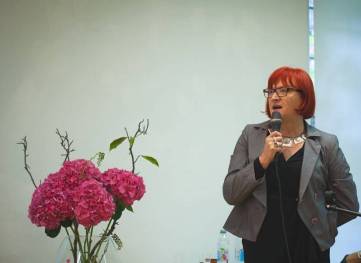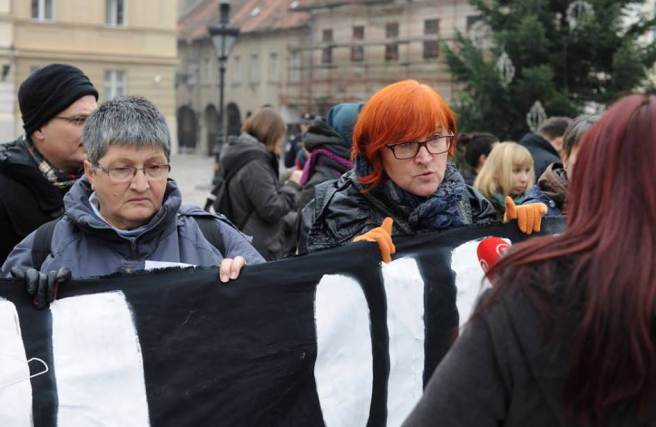
Members of the Initiative “Women Citizens for Constitutional Reform” had the opportunity to host Rada Borić and talk with her about feminist arguments and importance of gender sensitive language in the process of advocating for the adoption of the gender-responsive Constitution. From this meeting emerged this interview.
Rada Borić is executive director of the Center for Women’s Studies, longtime activist, theorist and primarily feminist. During the war in Croatia, she worked in Zagreb at the Center for Women War Victims, and she was a co-founder of the Center for Women’s Studies. For years she lived between Helsinki – Zagreb and author of the first Finnish-Croatian-Finnish Dictionary, which is also considered to be the first native vocabulary in which deliberately did not include the noun ‘koljačica’. At the University of Helsinki she conducted a course on the cultural history of the Balkans and worked as a lecturer of Croatian language and South Slavic literature. In 2007, she became Woman Knight of order White Rose of Finland – a medal granted by Finnish President Tarja Halonen, for her contribution to cultural cooperation.
That same year, the associates of the Center for Women’s Studies has launched the Days of Marija Jurić Zagorka, which began the process of reading the new Zagorka’s literary and journalistic activities, as well as her advocacy of women’s rights, which is not well known. She was vice-president of the European Women’s Lobby, the largest women’s organization in the EU, which brings together more than 2000 women’s organizations from 35 countries, and she is a member of the Advisory Board of the Initiative Women Nobel Peace Prize Winners.
Why are you interested in gender issues, the Constitution and the acting of women in this segment?
I lived in the former, socialist system in the belief that women and men are equal, and I was lucky, unlike many women, I’m not so clearly felt discrimination, but I recognized it. Since the early 80th years on women’s studies in America I realized what it means gender discrimination. I was doing research on women in academia community and I was with disbelief reading texts of deans and heads of various university departments who spoke discriminatory on the possibility of women in their advancement in the university community. For example, the dean of one faculty talked that the female vocal abilities are inferior to men, that they cannot teach large groups, but only in small, proofreading groups. I was angry because I had never heard anything discriminatory in the former Yugoslavia. Then I began to read more focused on feminism and the multiple discrimination of women and international approach to this helps us to understand the relationships of gender and class, race, age, sexuality, etc. and feminism should not be considered in the singular. When I returned in 1991 from the Helsinki University, the war had already assumed the actual contours. From 1993 to 1997 I worked at the Center for Women War Victims directly with women survivors of war violence. In parallel, in 1995 it is founded the Center for Women’s Studies, of which I am one of the founders. In setting up the study we were interested in answers to the causes of the war, especially the causes of war violence against women, which we very quickly understood as a continuum of violence, violence against women, of which it was less said in the socialist era. I linked the women’s activism and what I knew theoretically. It is important that, on the one hand, I work directly with women, so women who were refugees and displaced persons, working in self-help groups, which have been running on feminist principles of ethics concerns and helped the survival and empowerment of women, and at the same time I was advocating for female refugee rights.

You have the theoretical and activist experience, how do you see the connection?
I think we should not divide on the theoreticians and activists, as the activists are sometimes uncomfortable with theorists, or vice versa. I think that the theory is passion like the activism and it is extremely important that we knew the theory so it could be used as a ‘tool’ in activism. The Center for Women’s Studies is teaching feminist critique of language, and for me it is important to promote the realization of the first wave of feminism that says that language is a weapon against women, because it is full of sexism, and it is equally important to discover and extra-linguistic sexism and have a strategy how to fight against it. I am an activist when I protest on the street and as well when I warn about discrimination by writing to institutions or when I am lobbying for legislative changes in favor of women.
What is your view on the idea around which gathered the Initiative “Women Citizens for Constitutional Reform” and how important it is for BiH?
The Initiative “Women Citizens for Constitutional Reform” is very important for Bosnia and Herzegovina. In Croatia we failed to actively influence the drafting of the Constitution, taking care of women survivors of war violence. Our Constitution was adopted in 90s without women’s issues and human rights activists. Our laws look like “Swiss cheese” full of loopholes and can therefore be interpreted differently. Considering that we are usually tricked by those who have positions of power, I fear that a large number of amendments that the initiative stands will not be adopted. I’m afraid I will have to say “it has already in the preamble, catalog …” and ignore your comments and suggestions. But the idea that you have organized yourselves and talk about what are important priorities, individual relations to ethnicity or that native language enters the Constitution or on reproductive rights which we do not have in the Constitution, etc. is truly praiseworthy.
What are your recommendations for further action of the Initiative?
I think we should use all means of advocacy and lobbying. It is also important what you are advocating, and that is that the principle of direct democracy becomes part of the Constitution. In BiH there are different forums, civic initiatives, ad hoc coalitions and think it is important to cooperate with other initiatives. What we often forget is that we need solidarity in order to achieve change, and this initiative should ‘connect’ with other initiatives related to human rights and that, such human right’s initiatives, together advocate these issues, because these issues are not just “women’s issues”. I think we need to create synergies between all the movements if we want to succeed in making change. What neoliberal capitalism succeeded is that we are disunited, we turned to only our needs, rather than community. More important to us become our individual rights than the rights of communities. Women’s rights are as important as the rights of “women’s community”, but also the community of citizens, ‘blended’ with other rights, women’s rights and workers ‘rights, the rights of ethnic and sexual minorities, students’ rights … Imagine how the power by sharing and gathering strengthen.
How important is localization of the Constitution?
The Constitution was written relatively ‘dry’ and it is important that activists and women activists interpret its content, that is, rights and obligations that derive from it. It is important that we interpret it in an understandable way, tailored to people from communities, so they understand what we stand for: from gender rights to native language or direct democracy. We need to know to explain and advocate for the priorities we have chosen and try to explain them in a way that is understood as an important priority in the community.
What is your message to young women, the future theoreticians who write about constitutional issues?
Someone taught us that these issues are not interesting. But then I said, not everything can be interesting, we do not want that the Constitution be interesting. We should explain to young people that the Constitution is a fundamental document that will determine what will be their lives and that the Constitution is their document. Who is from young people read the Constitution, as well as items that are in the Constitution that concern them? Young people do not perceive the Constitution as a document that has something to do with them but it has and it will have. Therefore we have to read and interpret the Constitution and advocate for constitutional changes. We forget, and that is always important, that no matter what organization or initiative, a network of civil society organizations we operate in, the issue of constitutional change is an issue that concerns us all and must go “hand in hand” with the work of the trade unions and youth initiatives, environmental and individual organizations, networks as well as other civic initiatives. This is too important topic and we cannot leave changes to happen on their own.
Vildana Džekman,
PR of the Initiative “Women Citizens for Constitutional Reform”


